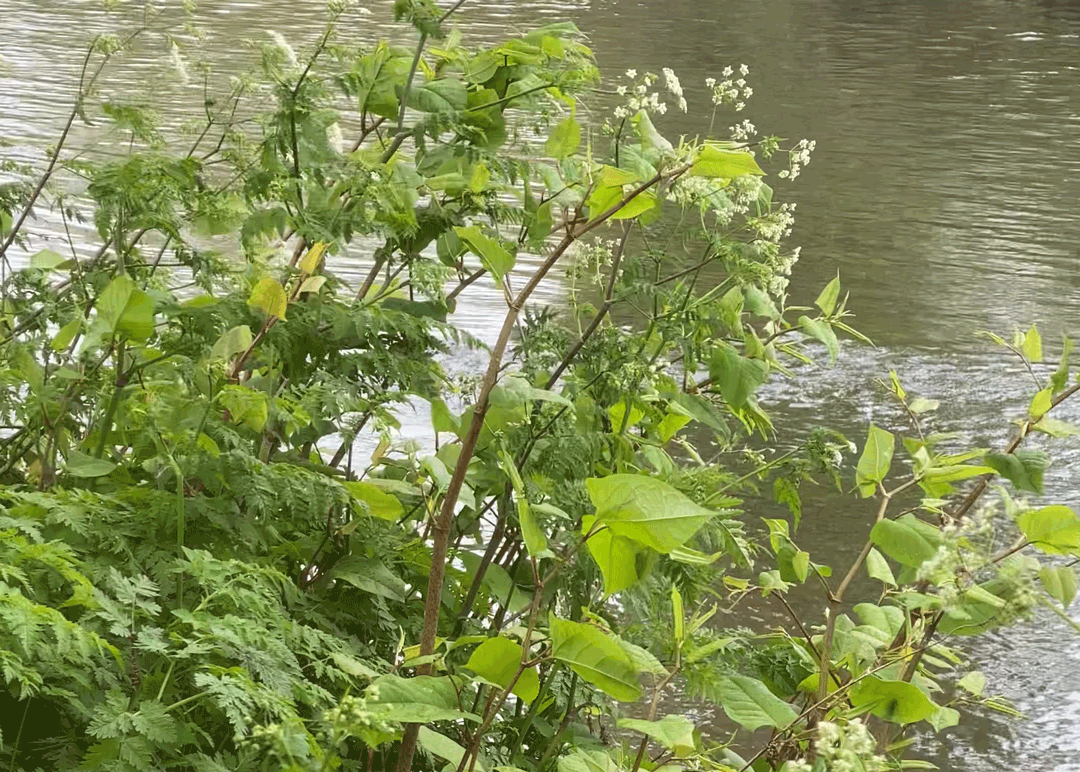Sat on the counter in an innocuous ziplock bag, is a most noxious thing. Malignly bent, miscreant by intent; its cold would-be cadaver primed to undermine the very foundations of civilisation. I can almost hear it jittering in its antihuman resolve, creaking to be released from between the polythene sheets.
Curious, then, that when I tried a bite it tasted quite like chard, albeit less oxalic in flavour. More mellow than tannic. Quite far, then, from the triffid-like creature I’d imagined; one equipped to divest me of my very humanity should it have the chance.
Despite its suitability for a light salad, there is reason behind this plant's social vilification. Should a slither of its rhizomatic stalk find itself in your property’s soil, and grow into a plant, you will be legally condemned unless you rid it at all costs.
If you find it on your property and decide not to take action, this plant could earn you your very own ASBO.1 And woe betide they who abet its spread, who might, according to Part II, Section 9 of the Wildlife and Country Act 1981, find themselves deserved of 6 months behind bars.23
I second-guessed posting about it, you know. Will someone track this down, will I be held responsible for government-decreed ecocide? I’ve gone as far as to include a caveat in its caption, that “this harvest was taken from a reported, untreated location.” I’m not sure whose ire this will sate, but it’s abated my self-admonishment.
Animate in its defamation, this plant is so maligned that it felt illicit to touch; a thrill of ill-doing in just plucking a leaf. Yet it was more than that, it was as if it would take root in my hand, parasitise my body, consume me alive.
I stung myself on a nettle wiping my knife clean after I was done harvesting—I was by far the most destructive creature there—and now the sting’s tingle is tinged with concern that there might be a rhizome embedded in my flesh. That I, too, will succumb to foundational rot should I not out that damned spot and purge myself of its corrosive evil.
Unlike Lady Macbeth, I am not an accomplice to regicide—even if the thought is appealing—so my hands are notionally clean. In fact, if this plant really is animate, the unwitting rhizomes-to-be in the stalks I harvested will suffer a worse fate than King Duncan; condemned to slowly drown and be digested by the ferments I will make of them. Yet it is awesome the power this polythene bag’s content has over me.
I’m reminded of the sublime; an aesthetic philosophy of the terrifying greatness of nature. Usually reserved for monumental things such as mountains and gorges, I feel it here in the hold this plant has over me. The knowledge that, should I dare to discard it improperly, a jungle will spring from its stem.
Both the sublime and my reaction to this plant are socially prescribed fear of the unknown. The sublime is something unfathomably larger than us, which is only able to be appreciated by this categorisation as something beyond our power. The plant, whose mere existence proves a persistent ability to resist our eradication, is a raw, uncontrollable power.
In this power it becomes the embodiment of abjection, shaking our society’s very foundations, literally and metaphorically. Whereas the sublime is passive—mountains, in all their might, care not what we think of them—the abject is active. It is intent on notionally corroding our rules and deconstructing our thinking… or so we think.
Abjection is often fear at the mere thought of something uncontrollable, and, in this, finds its power. Philosophers Mary Douglas,4 Michel Foucault,5 and Jonathan Dollimore6 have all, in their own words, theorised on this power; the power of that which is uncontrolled, and how this can have such a hold over us.
A power, indeed, that this plant has. The thought that its voracious appetite, once provoked, destroys all in its path, tumbling buildings, crumbling cities. The power it has over me, that I wash my hands after touching it, even after having washed the pa thrice. The power to think that it might send tendrils out of its plastic bag, that it might grow into the hidden corners of my home; into the hidden corners of me. Had it not won me over with its zingy flavour.
Don’t get me wrong, the plant is absolutely potent. It can crack through concrete, undermining everything we’ve built and persisting in existing despite our best efforts. But it does not deserve the ill will we have bestowed upon it, the supernatural evilness which chills us at its very sight. It is how it makes us doubt our self-professed superiority, this is what’s scary, not the plant. Japanese Knotweed holds us no ill will.
Or does it?
This piece was written in research for my upcoming supper club A Weed by Any Other Name… on 04/05/24. It will be published as part of a larger body of research on weeds for Tenderfoot, an online platform exploring engagement and negotiation with the world of stuff, material and objects.
Anti-Social Behaviour Order
Japanese Knotweed UK Law, Japanese Knotweed Help. (09/04/24) [https://www.knotweedhelp.com/japanese-knotweed-law/]
Wildlife and Countryside Act 1981, Legislation.gov.uk. (09/04/24) [https://www.legislation.gov.uk/ukpga/1981/69#commentary-c22562891]
Douglas, P. M. (2002). Purity and danger. London: Routledge.
147, Foucault, M. (2003[1966]). The Order of Things. London: Routledge. 147
106, Dollimore, J. (1991). Sexual Dissidence: Augustine to Wilde, Freud to Foucault. Oxford: Clarendon Press.





